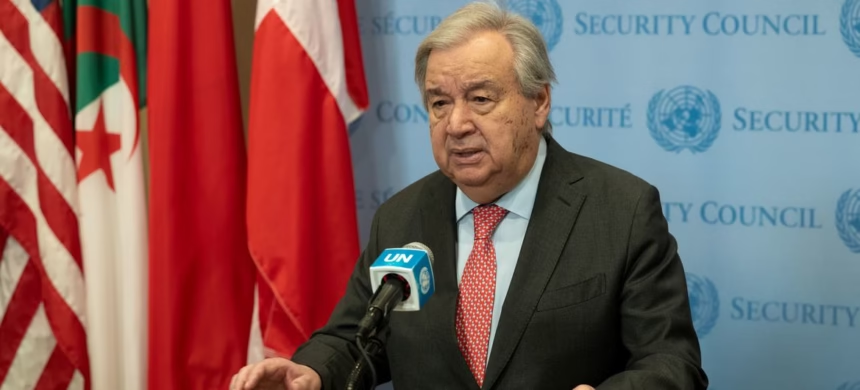The United Nations Secretary-General has strongly condemned a deadly attack that claimed the lives of at least 40 people in the commune of Cabaret, in Haiti’s Ouest Department, on the night of September 11.
In a statement delivered by his spokesperson, Stéphane Dujarric, the Secretary-General said: “The Secretary-General strongly condemns the reported killing of at least 40 people, including women, children, and the elderly, during a brutal attack carried out by armed gangs in the commune of Cabaret.”
Beyond the tragedy in Cabaret, the UN chief warned of a country gripped by a worsening spiral of violence. He said he was “alarmed by the level of violence shaking Haiti” and urged national authorities “to ensure that the perpetrators of these human rights violations and abuses are brought to justice.”
Amid this climate of insecurity, the UN is calling on Member States to step up their support for the Multinational Security Support Mission (MSS), providing personnel, funding, and logistics so it can more effectively assist the Haitian National Police in combating gangs, “in full respect of international human rights law.”
MSS: Origins, Mandate, and Shortcomings
The MSS was authorized by the UN Security Council through Resolution 2699, adopted on October 2, 2023.
The mission was created in response to a request from the Haitian government to help support its security forces in the fight against gangs, under Chapter VII of the UN Charter.
Led primarily by Kenyan forces, the MSS also includes contingents of police officers from other countries.
By mid-2025, however, the mission was far from reaching its operational goals or projected strength. Initially intended to deploy about 2,500 officers, the mission has been hampered by deployment delays, logistical challenges, and inadequate funding, severely limiting its effectiveness.
Both internal and external critics have highlighted shortcomings: lack of resources, dispersed personnel, weak communication with affected communities, and operational constraints in areas controlled—or fiercely contested—by gangs.
Between October 2024 and June 2025, nearly 4,864 people were killed in gang-related violence across Haiti.
The violence has triggered massive displacement, forcing hundreds of thousands of people to flee their homes. Rural areas and the outskirts of Port-au-Prince have been increasingly affected, including communes such as Cabaret. Reports of arson, massacres, kidnappings, and other serious human rights violations are now almost daily.
A new resolution has recently been introduced at the UN to replace the MSS with a larger UN-led force of more than 5,000 troops. Efforts are under way to rally broad support from Member States.
Cabaret Massacre in Context
The UN statement was issued on September 13, 2025, in response to the September 11 attack in Cabaret.
The commune, located in the Ouest Department, has long been affected by gang presence and repeated incursions.
While the precise motives and identities of the attackers have yet to be publicly confirmed, the UN attributed the killings to “armed gangs” and stressed the importance of holding those responsible accountable.
The Secretary-General insisted that “the perpetrators of these human rights violations and abuses be brought to justice,” underscoring the imperative of accountability.
The need to reinforce the MSS was also highlighted: the mission must be provided with “the necessary logistics, personnel, and funding” to operate effectively.
One of the major challenges remains the lack of resources—financial, material, and human. Although the MSS exists, its numbers and capacity to operate in dangerous zones remain limited.
Another challenge is the question of sovereignty and local cooperation. For the mission to be both accepted and effective, it must work in close coordination with the Haitian National Police, respect human rights, operate transparently, and build trust with communities traumatized by years of violence, impunity, and abuse.
The Cabaret massacre reflects Haiti’s alarming deterioration in security, as gangs expand their control, state authority erodes, and extrajudicial violence becomes widespread. The UN communiqué stressed two urgent priorities: securing justice for the victims and reinforcing the MSS as a key tool for security assistance.
The coming months are expected to be decisive. If the international community fails to respond to the UN’s calls to strengthen the mission, the cycle of attacks may continue unchecked, with rising human costs. Haiti’s ability to restore order, protect its citizens, and rebuild public trust will largely depend on these two pillars: accountability and credible international security support.








